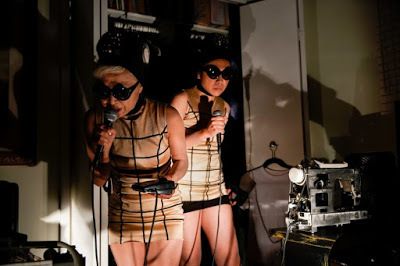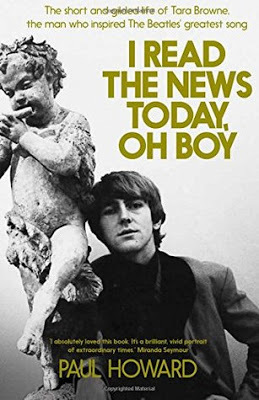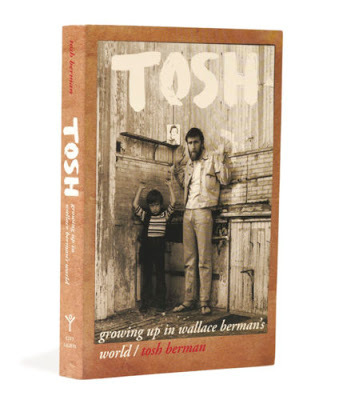Tosh Berman's Blog, page 130
December 1, 2019
BOOK MUSIK 12 - "Face It" by Debbie Harry
Tosh and Kimley discuss Face It by Debbie Harry of Blondie fame, probably the most well-known band from the famed 70s CBGB music scene in New York. Harry was hugely influential as one of the first women to lead a rock band and has spent most of her life hanging out with the denizens of the creative worlds of NYC. Andy Warhol, David Bowie, Iggy Pop, Patti Smith, and Jean-Michel Basquiat are just a few of the intriguing people who show up in this memoir. She has some tales to tell but we were left with the nagging feeling that there’s more to the story than meets the eye.
Published on December 01, 2019 07:56
November 30, 2019
Tosh's Journal - November 30 (Tosh's Museum)
Tosh's Journal: November 30. This is my reading (with lots of more images) of my need to have a museum collection devoted to yours truly. - Tosh Berman
Published on November 30, 2019 17:03
November 25, 2019
Tosh's Journal - November 25 (Yukio Mishima)
My commentary on Yukio Mishima's army.
Published on November 25, 2019 17:15
November 24, 2019
Tosh's Journal - November 24 (Depression)
Tosh's Journal - November 24 (Depression) Read the original here: http://tamtambooks-tosh.blogspot.com/2014/11/november-24-2014.html
Published on November 24, 2019 18:35
November 22, 2019
Tosh's Journal - November 22 (A tribute to J.D. Tippit)
November 22 stays in my mind, of course, because of “that death,” but also there was another death that day in Dallas, Texas - The death of J.D. Tippit. He was a police officer with the Dallas Police Department. Read the rest: http://tamtambooks-tosh.blogspot.com/2014/11/november-22-2014.html
Published on November 22, 2019 19:19
November 15, 2019
BOOK MUSIK No. 11 - "This Searing Light, The Sun and Everything Else: Joy Division: The Oral History" by Jon Savage
Book Musik 11 – This Searing Light, the Sun and Everything Else: Joy Division: the Oral History by Jon SavagePosted on November 15, 2019 by Book MusikTosh and Kimley discuss This Searing Light, the Sun and Everything Else: Joy Division: the Oral History edited by Jon Savage. Joy Division seems to be the poster band for the doom and gloom of the industrial city of Manchester, England. This book is a lively telling of their relationship to the city and the development and twists and turns of a young band. Equally important are the key players who helped them along the way including the engaging entrepreneur Tony Wilson, the brilliant producer Martin Hannett and the iconic graphic designer Peter Saville
Published on November 15, 2019 08:13
November 7, 2019
Les Sewing Sisters in the Los Angeles Times

Les Sewing Sisters in the Los Angeles Times
My wife Lun*na Menoh's band Les Sewing Sisters have a right-up or article in the Los Angeles Times.
Published on November 07, 2019 12:40
November 6, 2019
"TOSH" Reviewed in Art in America
Published on November 06, 2019 09:13
November 3, 2019
"I Read The News Today, Oh Boy" by Paul Howard

At the moment, I'm going through a tunnel that is cold/ill based, and it is books like "I Read The News Today Oh Boy" that makes me want to live. The comprehensive biography of a young man who didn't live long, and didn't do anything, except was an exceptional presence in various people's lives. My favorite sort of person. Tara Browne was a wealthy fellow who was fortunate to have a money background, but also the grace of being a very nice gentleman in the world of the 1960s London pop culture. A friend of Brian Jones, Paul McCartney, as well as his brother Mike (McGear), this is very much a narrative of England throughout the early and mid-20th-century. Paul Howard does an excellent job of capturing an era in a positive light that is readable and fascinating.
Tara was very much of a 'now' personality. He lived his life in such a manner that is full of love, respect, but also he was blessed to have a mother that was very much a bohemian herself. As a boy, he was raised among adults and participated in parties and social outings. He hated school, and in a sense, you can say he was spoiled, but alas, that is not totally true. I think he was a good spirit that people attached themselves to him.
Tara Browne died when he was 21 years old. He was driving fast in London and avoiding another car; he rams his vehicle into a parked car. Tara was obsessed with cars and speed. By all accounts, he was an excellent driver. In a nutshell, Browne was a dandy, car racer, and knew the more beautiful things in life. He introduced L.S.D. to McCartney, for instance.
His death inspired Lennon by writing "Day in the Life," but to many who knew him, they felt his death was the end of the 60s utopian dream. For anyone who has an interest in Brian Jones, The Beatles, and London 60s, this book is a must-read.
Published on November 03, 2019 20:07
November 1, 2019
BOOK MUSIK No. 10 - "Golden Hits of the Shangri-Las by Ada Wolin (33 1/3 Books)
Tosh and Kimley discuss Golden Hits of the Shangri-Las by Ada Wolin from the 33 1/3 series. The Shangri-Las were a teenage girl group of the 1960s with a reputation for coming from the mean streets of Queens, NY. Their world was bleak and things always ended badly in the melodrama of their biggest hits like “Leader of the Pack” and “Remember.” They had a huge influence on a diverse group of musicians from The NY Dolls and The Damned to Blondie and Alex Chilton. We venture down the path of their dark world.Theme music: “Behind Our Efforts, Let There Be Found Our Efforts” by LG17
Published on November 01, 2019 07:17




